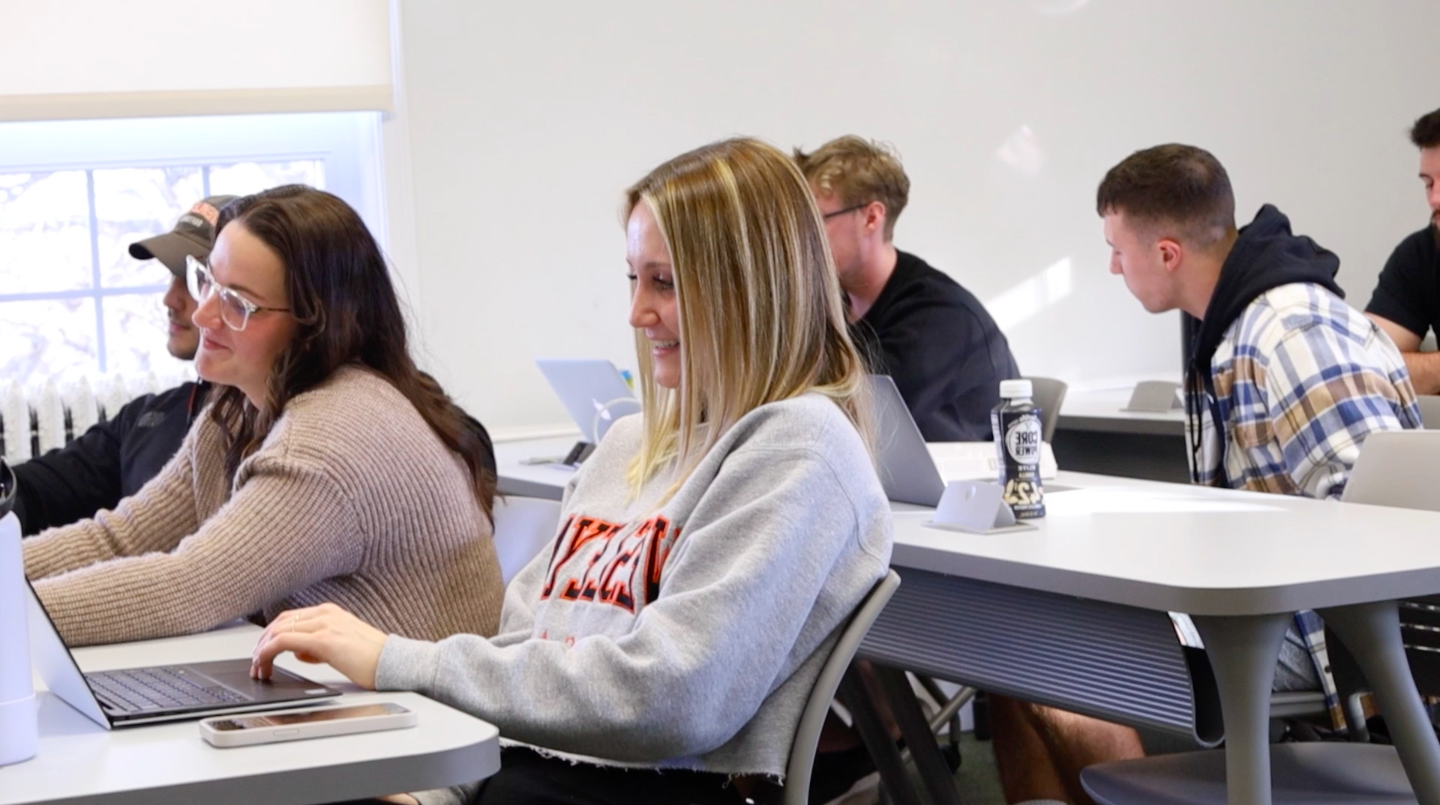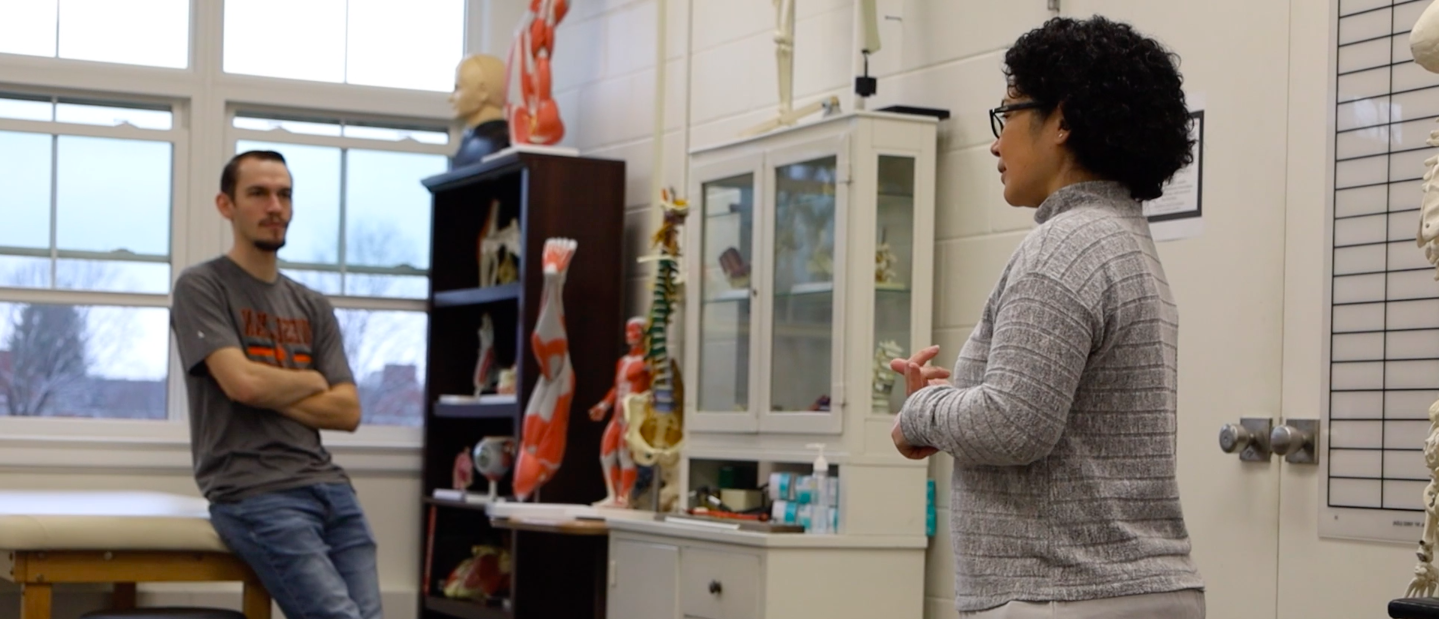Nursing
Colleges and Programs of Study
The personal attention our students receive has an undeniable impact on their outcomes. Small class sizes and a student-to-faculty ratio of 13:1 create an intimate, caring learning environment that produces an impressive number of Fulbright Scholars and other notable academic achievements.
Students engage in a rigorous curriculum, which prepares graduates to enter the profession as safe, skilled practitioners who demonstrate critical thinking, effective communication, and a foundation for graduate study in nursing.
The mission of the School of Nursing is to provide accessible, high-quality nursing education to a diverse group of undergraduate and graduate students, preparing them to be reflective healthcare leaders and scholars able to respond to the growing complexity in the healthcare system. This mission will be accomplished by offering innovative, nursing education programs that meet the needs of society and incorporate best-practice evidence and contemporary nursing science. Beliefs fundamental to the mission, development, and arrangement of the curriculum include: an understanding of the fundamental dignity of human beings, the essence of nursing as science, art, and service to humanity informed by the caring nature of the discipline, the perspective of health as a dynamic entity varying with time and life circumstances, and the life-long process of education.
Undergraduate and graduate study in nursing prepares women and men to promote human thriving in the care of diverse persons through culturally-sensitive, evidence-based practice. The unique meanings persons associate with knowledge, language, and behavior inform caring practice in nursing. People flourish in the context of partnerships with individuals, families, communities, and populations that reflect respect for the dignity and uniqueness of others, recognizing each person’s capacity for grace and empowerment.



-
Nursing- B.S.N
- SLO I: Integrate knowledge from liberal arts, nursing science and related disciplines to inform practice and make reasonable clinical judgments.Level Competencies: Translating and Integrating Scholarship into Practice: Integrate evidence, clinical judgment, inter-professional perspective and patient preference in planning, implementing and evaluating outcomes of care.
- Sophomore Level Competency: Examine sources of information and recognizes the effects of clinical judgment, interprofessional perspective and patient preference in planning, implementing and evaluating outcomes of care.
- Junior Level Competency: Make use of evidence, reflecting on the effects of clinical judgement, inter-professional perspective and patient preference in planning, implementing and evaluating outcomes of care.
- Senior Level Competency: Incorporate evidence, clinical judgment and interprofessional perspective and patient preference in planning, implementing and evaluating outcomes of care.
Background for Practice: Integrate theories and concepts from liberal education to build an understanding of the human experience.
- Sophomore Level Competency: Recognize the role of theories and concepts from liberal education in building an understanding of the human experience.
- Junior Level Competency: Apply selected theories and concepts from liberal education to an understanding of the human experience
- Senior Level Competency: Incorporate theories and concepts from liberal education to build an understanding of the human experience.
SLO II: Effectively communicate and collaborate as a member and leader within the interdisciplinary healthcare team to improve patient care outcomes
Level Competencies:
Inter-professional collaboration and communication to provide quality patient-centered care: Demonstrate effective inter-professional communication and collaboration to provide quality patient-centered care.
- Sophomore Level Competency: Describe own strengths, limitations and values in functioning as a team member.
- Junior Level Competency: Communicate with team members, adapting own style of communicating to the needs of the team and situation.
- Senior Level Competency: Demonstrate team-building and collaborative strategies when when working with interprofessional teams.
SLO III: Ethically manage the direct and indirect care of individuals, families, groups, communities and populations to promote, maintain and restore health.
Level Competencies:
Baccalaureate Generalist Nursing Practice: Demonstrate evolving competence in professional role within a dynamic, multicultural, global society.
- Sophomore Level Competency: Elicit patient values, preferences and needs as part of clinical interviews and implementation of nursing plans of care.
- Junior Level Competency: Conduct comprehensive and focused physical, behavioral, psych-social, and spiritual assessments using developmentally and culturally appropriate approaches.
- Senior Level Competency: Implement holistic, culturally-appropriate, patient-centered care that reflects understanding of human growth and development, pathophysiology, pharmacology, and medical and nursing management for persons across the lifespan in all healthcare settings
SLO IV: Provide population-focused, culturally-competent, holistic nursing care focusing on health promotion and disease and injury prevention.
Level Competencies:
Clinical Prevention and Population Health for Improving Health: Assess protective and predictive factors that influence the health of individuals, families, groups and populations.
- Sophomore Level Competency: Discuss ways to assess health/illness beliefs and values and personal health practices of individuals and families.
- Junior Level Competency: Assess health/illness beliefs, values, attitudes and practices of indiviudals, and families.
- Senior Level Competency: Use evidence-based practices to guide health teaching, health counseling, screening, outreach, disease and outbreak invesitgation, referral and follow-up throughout the lifespan.
SLO V: Demonstrate leadership and management skills in the use of human, fiscal, material and information resources in the provision of safe, quality nursing care.
Level Competencies:
Organizational and Systems Leadership; Quality Improvement and Safety: Use leadership skills and knowledge of healthcare to advance high quality, safe professional practice.
- Sophomore Level Competency: Identify leadership skills in the advancement of safe, professional healthcare practice.
- Junior Level Competency: Begin to use leadership skills and knowledge of healthcare for high quality, safe professional practice.
- Senior Level Competency: : Use leadership skills and knowledge of healthcare for high quality, safe, professional practice.
Health Policy and Advocacy: Demonstrate basic knowledge of healthcare policy, financing, and regulatory environments in advocating for safe professional practice.
- Sophomore Level Competency: Identify healthcare policies that affect professional practice.
- Junior Level Competency: Discuss the relationships among healthcare policy and financing and safe professional practice.
- Senior Level Competency: Assess how healthcare policy, financing, and regulatory environments affect safe professional practice.
Informatics and Healthcare Technologies: Manage information and technology to deliver quality patient care in a variety of settings.
- Sophomore Level Competency: Discus why information and technology skills are essential to safe, quality patient care.
- Junior Level Competency: Contrast benefits and limitations of different information and technology systems and their impact on safety and quality. Document and plan patient care in an electronic health record.
- Senior Level Competency: Use information management tools to monitor outcomes of care in a variety of settings.
SLO VI: Demonstrate a commitment to professional growth and improvement, valuing life-long learning and the betterment of the profession.
Level Competencies:
Advancing Professionalism and Professional Values: Demonstratel the professional standards of moral, ethical and legal conduct.
- Sophomore Level Competency: Discuss professional standands and professionalism in nursing including the inherent values of altruism, autonmy, human dignity, integrity and social justice.
- Junior Level Competency: Demonstrate professionalism, inclduing atttention to appearance, demeanor, respect fr self and others, and attention to professional boundaries with patients and families as well as among caregivers.
- Senior Level Competency: Identify personal, professional and environmental risks that impact personal and professional choices and behaviors
- SLO I: Integrate knowledge from liberal arts, nursing science and related disciplines to inform practice and make reasonable clinical judgments.Level Competencies: Translating and Integrating Scholarship into Practice: Integrate evidence, clinical judgment, inter-professional perspective and patient preference in planning, implementing and evaluating outcomes of care.
-
Nursing- M.S.N
SLO I: Integrate theory and research from sciences, social sciences, humanities, and nursing into interdisciplinary practice to promote safe and effective nursing care.
- Translating and Integrating Scholarship into Practice: Integrate theory, evidence, clinical judgment, research and inter-professional perspectives using translational processes to improve practice and associated health outcomes for patients.
- Background for Practice from Sciences and Humanities: Synthesize nursing science with knowledge from ethics, biophysical, psychosocial, analytical, public health and organizational sciences to design advanced nursing care for diverse populations.
SLO II: Lead inter-professional teams to improve patient and population health outcomes
- Interprofessional Communication and Collaboration for Improving Patient and Population Health Outcomes: Employ effective collaborative strategies and communication skills in leading intra-professional and inter-professional teams in the design, coordination, and evaluation of patient-centered care.
SLO III: Demonstrate clinical competence in a specialty that is anchored in ethical advanced nursing practice.
- Master’s-Level Nursing Practice: Synthesize concepts including ecological, global and social determinants of health, principles of genetics and genomics, and epidemiologic data to design, deliver and evaluate culturally relevant clinical interventions and strategies.
SLO IV: Design population-focused, culturally-competent health services for vulnerable populations.
- Clinical Prevention and Population Health for Improving Health: Using culturally sensitive approaches, conduct a comprehensive and systematic assessment of health and illness parameters in a complex situation.
SLO V: Apply principles of leadership in the application of strategies such as evidence-based best practices, performance improvement and quality assurance activities and information technology initiatives to improve patient care and health systems.
- Organizational and System Leadership; Quality Improvement and Safety: Operationalize safe, quality health care services, applying leadership skills and ethical decision-making in the provision of culturally-responsive high quality nursing care.
- Health Policy and Advocacy: Analyze the impact of health policies on the structure and financing of health care, healthcare practices and healthcare outcomes.
- Informatics and Healthcare Technologies: Analyze current and emerging technologies and develop strategies to support safe practice environments and reduce risk while optimizing patient safety, cost-effectiveness and health outcomes.
SLO VI: Develop professional goals that reflect a commitment to professional development, lifelong learning and continued scholarship.
- Professionalism and Professional Values: Contribute to the profession of nursing by engaging in leadership, scholarship and practice activities.
-
Nursing DNP
SLO I: Translate knowledge from the sciences and nursing to promote optimal health in vulnerable populations, diverse settings, and systems.
- Scientifc Underpinnings for Practice: Integrate nursing science with knowledge from ethics, biophysical, psychosocial, analytical, public health and organizational sciences to design advanced nursing care for diverse populations. (DNP Essential I)
- Clinical Scholarship and Analytical Methods for Evidence-Based Practice: Translate the results of evidence-based practice protocols, systems changes and health care initiatives for health disparities and vulnerable populations. (DNP Essential III)
SLO II: Lead inter-professional teams to effect change and improve patient and population health outcomes
- Interprofessional Collaboration for Improving Patient and Population Health Outcomes: Employ effective collaborative strategies and communication skills in leading intra-professional and inter-professional teams in efforts to improve patient and populatin health outcomes for vulnerable populations. (DNP Essential VI).
SLO III: Advance the practice of nursing through clinical scholarship and scientific inquiry to transform health care practice and systems in one’s area of specialization.
- DNP-Level Nursing Practice: Employ advanced levels of clinical judgment, systems thinking, and accountability in designing, delivering, and evaluating evidence-based care to improve patient and system outcomes. (DNP Essential VIII)
SLO IV: Design population-focused, culturally-competent health services for vulnerable populations.
- Clinical Prevention and Population Health for Improving the Nation’s Health: Critically appraised concepts including ecological, global and social determinants of health, principles of genetics and genomics, and epidemiologic data to enhance the design, delivery and evaluation of culturally relevant clinical interventions and strategies for vulnerable populations. (DNP Essential VII)
SLO V: Assume leadership roles and collaborate with other professionals to effect changes within complex systems.
- Organizational and System Leadership for Quality Improvement and Systems Thinking: Ensure accountability for quality health care services and safety of patient populations; apply leadership skills and ethical decision-making in the provision of culturally-responsive high quality nursing care. (DNP Essential II)
- Health Care Policy for Advocacy in Health Care: Critically analyze the impact of health policies on the structure and financing of health care, healthcare practices and healthcare outcomes. (DNP Essential V)
- Information Systems/Technology and Patient Care Technology for the Improvement and Transformation of Health Care: Provide leadership in the analysis of current and emerging technologies. Develop strategies to support safe practice environments while reducing risk and optimizing patient safety, cost-effectiveness and positive health outcomes. (DNP Essential IV)
-
Mon Scholars Program
The Mon Scholars Program provides Scholarship assistance offered to School of Nursing programs
and their nursing students with the promise of
employment with Mon Health System after
completing their degree.Requirements
To apply for the Mon Scholars Program, the
applicant must have:- Cumulative 2.0 GPA
- If the student has less than 12 credits of college coursework, a high school GPA of 3.0 is required
Resident of WV, MD, OH, or PA - Admitted to the WVWC School of Nursing
To Apply
Complete the online Mon Scholar Application
available at: Mon Scholars ProgramSubmit letter of admission that you received
to the WVWC School of Nursing.Questions? Contact
Recruitment@monhealthsys.org -
Program Goals
The goals of West Virginia Wesleyan School of Nursing reflect the overall mission of the program to enhance the health and quality of life for all.
+ Develop academic programs that meet the needs of society and incorporate best practices in nursing education.
+ Provide a supportive, collegial environment that encourages excellence in teaching-learning, professional development, and faculty/student scholarship.
+ Develop leaders capable of improving clinical practice outcomes, health policy, and care delivery methods.
+ Prepare graduates able to provide safe, evidence-based, culturally-competent, patient-centered care that reflects ethical clinical judgment and interprofessional collaboration.
+ Cultivate in students an intellectual desire for advanced study and inquiry.
-
Mon Health Nursing Fellows
- Mon Health Nursing Fellows provides an opportunity for nursing students to have up to $20,000 of their nursing degree funded by Mon Health in exchange for a 2-3 year work commitment after graduation.
- Requirements
- To apply for the Mon Health Nursing Fellows program, students must:
- Be in good academic standing with a GPA of 2.8 or higher
- Be a US Citizen, US Permanent Resident, or have residency under DACA or TPS programs
- Be able to provide a physical verifiable US domestic address
- To Apply
- For the Mon Health Nursing Fellows program, you will need to submit the following application materials:
- 200-400 word essay
- Proof of academic standing (official or unofficial transcript)
- For the Mon Health Nursing Fellows program, you will need to submit the following application materials:
- To apply for the Mon Health Nursing Fellows program, students must:
-
RN to MSN
Click here for more information.
-
Graduate Programs
-
Faculty
Amy Coffman, DNP, MSN, APRN-BC, FNP, Director, Graduate Programs and Associate Professor
Office: Middleton Hall 4
Phone: 304-473-8227
Email: coffman_a@airllevant.comShannon Bosley, DNP, MSN, RN, Assistant Professor, Simulation Director
Office: Middleton Hall 120
Phone: 304-473-8221
Email: bosley_s@airllevant.comTheresa Poling, DNP, MSN, APRN-BC, FNP, Associate Professor
Office: Middleton Hall 7
Phone: 304-473-8220
Email: polinh_t@airllevant.comValerie Jordan, BSN, RN, Visiting Assistant Professor
Office: Middleton Hall 8
Phone: 304-473-8231
Email: jordan.v@airllevant.comKimberly Baughman, MSN, RN, Assistant Professor
Office: Middleton 26
Phone: 304-473-8003
Email: baughman.k@airllevant.comSandra Oster, MSN, RN, Assistant Professor
Office: Middleton 27
Phone: 304-473-8229
Email: oster.s@airllevant.comPart-time Faculty
- Tina Straight, DNP, MSN Ed. CNE, RN
- Janet Teachout-Withersty, DNP, CNS, Associate Professor Emeritus
- Amie Hawkins, MSN, RN
- Patricia Moore, MSN, RN
- Susan Rice, PhD, MDiv, RN
Programs of Study
-
Art and Design

-
Biology & Environmental Science

-
Business

-
Chemistry & Biochemistry

-
Communication & Media

-
Education

-
English

-
Exercise Science & Athletic Training

-
Health Sciences

-
History and International Studies

-
Mathematics & Computer Science

-
Music

-
Nursing

-
Philosophy and Religious Studies

-
Physics & Engineering

-
Psychology

-
Social Sciences

-
Theatre and Dance Department


